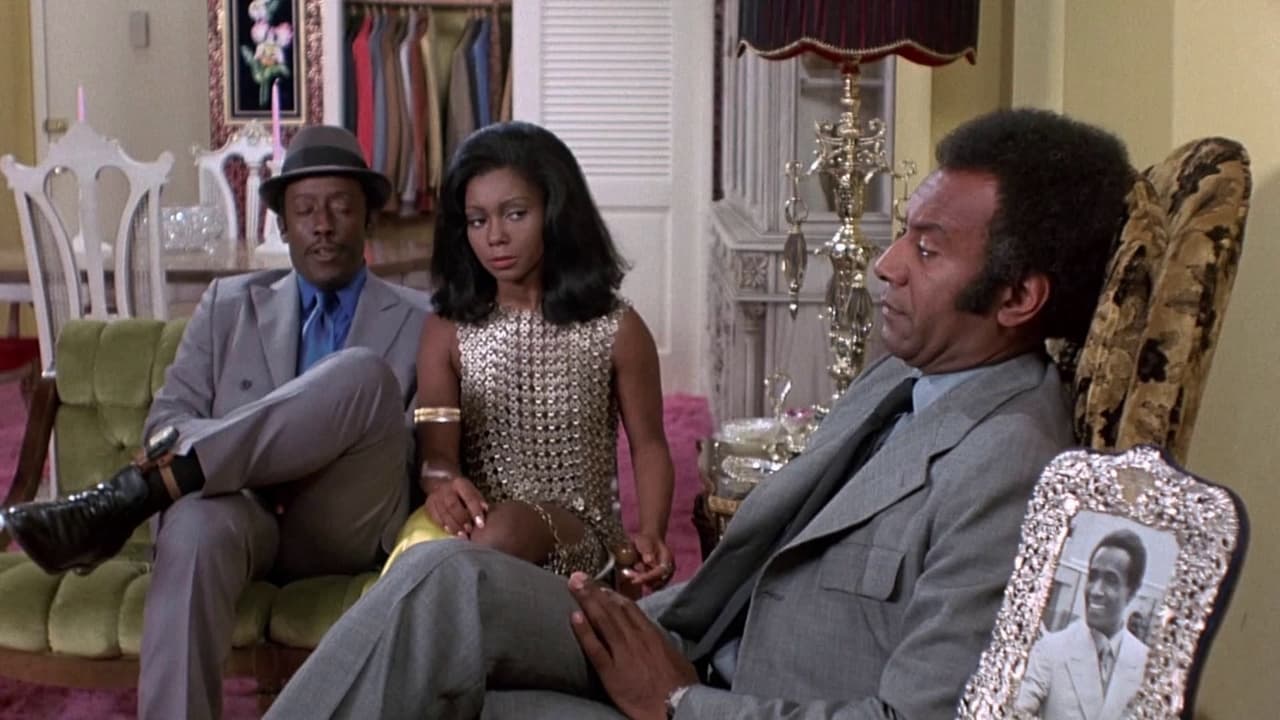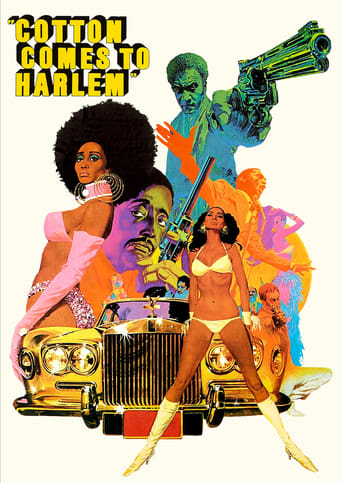

One of my all time favorites.
... View Morean ambitious but ultimately ineffective debut endeavor.
... View MoreIt's the kind of movie you'll want to see a second time with someone who hasn't seen it yet, to remember what it was like to watch it for the first time.
... View MoreIf you're interested in the topic at hand, you should just watch it and judge yourself because the reviews have gone very biased by people that didn't even watch it and just hate (or love) the creator. I liked it, it was well written, narrated, and directed and it was about a topic that interests me.
... View MoreGreat romp of a film. As has been said, this might be considered the first blaxploitation film. It is Ossie Davis' directorial debut and he shows great skill in overseeing all aspects of the production, from the music, to a wonderfully filmed car chase, and from great performances to making a film that balances humor and action adeptly. He uses locations in Harlem such that Harlem is a character in the film. The characters are warm and familiar and well-drawn. Interaction among black and white characters is generous and complex and I love to see that. He has a very light, confident touch across production and his fingerprints are all over the film insofar as everything is handled JUST right. The stars, Gravedigger Jones (Godfrey Cambridge) and Coffin Ed Johnson (Raymond St. Jacques) are two cops with a reputation for being a bit rough around the edges, but for keeping their word. Their motto: "We mighta broke a few heads but we never broke our word". A hustling minister, Rev. Deke O'Malley (Calvin Lockhart) rides into town and Coffin and Gravedigger believe he is a scam artist who has stolen money from poor, hard-working black folks. This offends their sensibilities and they pursue the Reverend, believing he is selling communities bad bills of goods. Honestly I wish that the film hadn't included the robbery. I think the Reverend makes such an great bad guy and the cops such good guys that I would have enjoyed more focus on them.That being said one of the Reverend's rallies is targeted by thieves and $87,000 is stolen. As the crooks make their getaway pursued by the Reverend and then by the cops, the money falls out of the back of the crooks' truck, wrapped in a bale of hay. As the detectives investigate the crime, we encounter sweet, tough old ladies, junkies (Cleavon Little as Lo Boy and Van Kirksey as Early Riser), bumbling cops (Dick Sabol as Varema), a vengeful Other Woman (Judy Pace as Iris), and a perenially scuffling junk dealer (Redd Foxx as Uncle Bud).The plot is a bit convoluted but it allows us to get to know Uncle Bud and some of the local characters. Redd Foxx, previewing his character in "Sanford and Son" is lovable and decent, but always down on his luck. On the basis of these performances, Godfrey Cambridge and Raymond St. Jacques should have been bigger stars. They ooze charisma and confidence and they eat up the camera in their scenes. Once one sees how their characters operate, one just wants to see more of them because one can see that while they might be a bit edgy, they are decent men. I don't know if 48 Hours or Lethal Weapon might have based their characters' dynamics on these characters, but it is certainly plausible. Calvin Lockhart gives his character a greasiness that seems natural. His sleaziness seems innate. That is a tribute to Lockhart's acting. He makes the Reverend naturally slick. He really seems completely disreputable. Judy Pace is smoldering as his mistress and she also dominates the scenes she is in. She is very sexy and when she is wronged, her wrath is ferocious. She really is outstanding in the film. The white cops, Capt. Bryce (John Anderson as a more old-fashioned type) and Lt. Anderson (Eugene Roche) who trusts Gravedigger and Coffin, are great.As I said, I thought the car chase was excellent. It's one of the better car chases I've seen. It isn't too long but the perspectives taken by cinematographer Gerald Hirschfeld, the tracking of the car, and how realistic the chase seems, make it a lot of fun and very well-executed. I thought it was great. Also of note, Harlem is full of life in this film. There is one tracking scene where a great piece of music follows the camera as it pans over various businesses in Harlem. It's great to see the various aspects of the community and see the positive side of it rather than the blight and decay that too often stands in for depictions of the community in many films.Ossie Davis went on to direct several other films and he showed in this one that that opportunity was well-deserved. As I mentioned, the work he gets out of his actors, his use of locations, the cinematographic choices he makes, and the blend of humor and action make this a very enjoyable movie which should get more credit as perhaps the first blaxploitation film. I think he deserves the most credit for the film's success and this is one that could withstand repeated viewings.
... View MoreOver the years, I've seen this movie on old, grainy, scratchy prints with runny color and muffled sound. I just viewed the DVD of this movie, and it's the first viewing I've had of a decent print with a decent video transfer. This has led me to revise what I long thought of the film.First revision: I hadn't before realized how good the cinematography is. The images are detailed, well-composed, and carefully lit; the editing is sharp without being obvious.I also hadn't recognized how good the acting is; the actors are all energetic without chewing up the scenery, they are clearly working hard to capture the right tone for the piece without looking like they're working hard.Finally, now that I can hear all the dialog clearly, I realize, first, just how funny it is, and second, just how true to the source novel it is. Although Davis adds touches here and there, and of course some of the novel gets left out, Davis is really making a strenuous effort to remain true to the spirit of Chester Himes, one of the finest American novelists writing in the crime genre.Because Davis pushes his characterizations perilously close to stereotypes, the film will probably never receive the recognition it deserves. I think Davis manages to restrain the stereotyping at all the right moments, and the whole film comes together beautifully. In short, this is a true classic.
... View MoreOne of the better black exploitation pictures to come out of the Seventies was Cotton Comes To Harlem where Raymond St. Jacques and Godfrey Cambridge gave a black twist to the male buddy film that so many white actors had done over the years going all the way back to James Cagney and Pat O'Brien.St. Jacques and Cambridge play a pair of police detectives assigned to a precinct north of Central Park where they've drawn duty being security for a rally headed by the Reverend Calvin Lockhart who's got a nascent Back to Africa movement going. He's collecting money at his rally and preaching up a storm when some masked bandits armed with automatic weapons take off with the proceeds. The money gets hidden in a bale of cotton and then the bale gets ripped off.Our two detectives got a whole host of suspects, some white numbers gangsters from Pleasant Avenue, black militants, the good reverend himself who St. Jacques has a passionate dislike for and various and assorted other criminal types. Lockhart is one charismatic preacher and as he says himself, he could be another Marcus Garvey who immediately came to mind before Lockhart mentioned his name during the film.John Anderson and Eugene Roche are St. Jacques and Cambridge's superiors in the police department, Anderson impatient with them and Roche inclined to give them plenty of room to maneuver. Judy Pace plays Lockhart's mistress and one seductive temptress if there ever was one. And we can't forget Redd Foxx in a delightful performance as an old rummy whose ship might just be coming in.Cotton Comes To Harlem moves at a very fast pace with absolutely not a wasted frame of film. It holds up very well after almost 40 years even if those fashions and those Afros don't.
... View MoreOne of the most influential pictures ever to shoot onto the screen, "Cotton Comes To Harlem" spawned the beginning of the blaxploitation action boom in 1970 by delivering a refreshingly different detective action yarn with a lot of humor,a lot of hard-hitting drama with a lot of black soul(It was know as SOULPOWER!). An unbeatable mix of fastpaced adventure and sheer comic having spiced with spectacular shootouts and chases with a lot of fast talking and tough repartee with solid performances by Godfrey Cambridge,Raymond St. Jacques and Calvin Lockhart no to mention to comedic timing of Redd Foxx. This picture became a milestone for a genre of action movies that would remain throughout the rest of that decade(including its sequel "Come Back Charleston Blue" two years later).
... View More